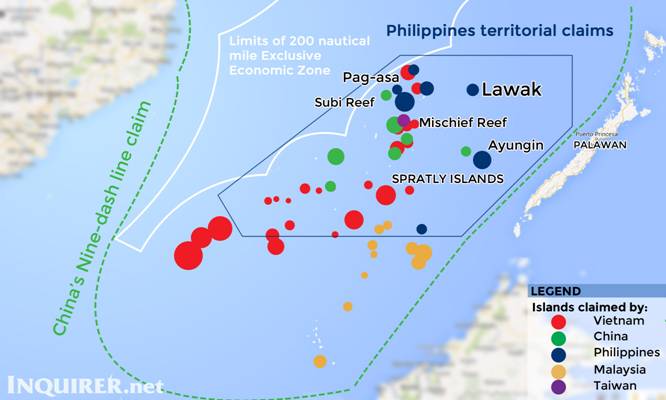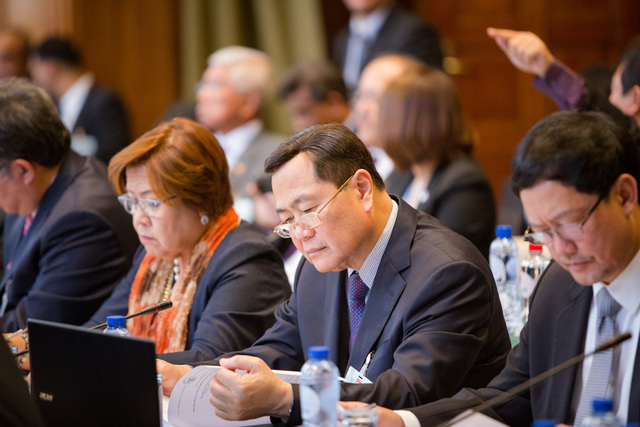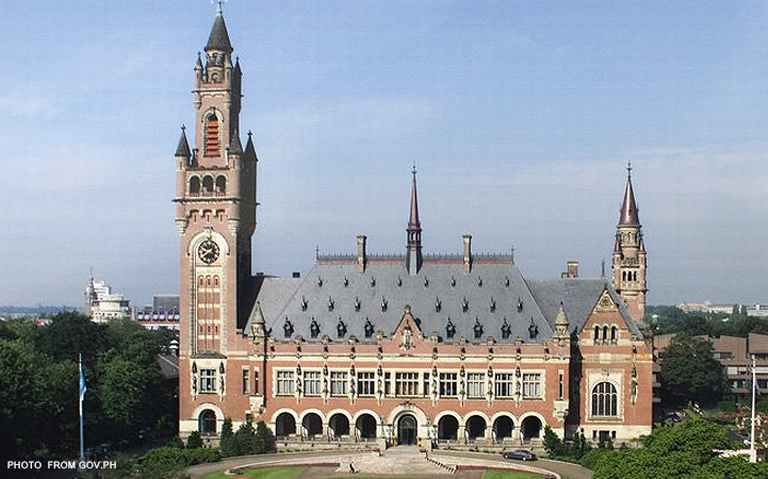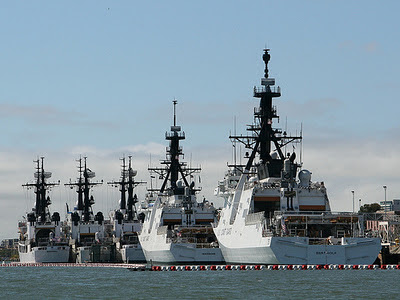A United Nations convention is clear on what constitutes sovereign territory, and the United States is prepared to do whatever is asked of it by the Philippines in connection with the South China Sea / West Philippine Sea dispute, US Ambassador Harry Thomas Jr. said Monday (June 13, 2011) in Makati. Thomas Statement is absolutely opposite of the statement of Rebecca Thomson; US spokesperson saying “The US will not support the Philippine Spratly Issue as they are out of the Issue. Even USA is not united of their stands for the Spratlys issue.
“We will do whatever we’re asked,” Thomas told The STAR during a visit to the newspaper office, when asked if the US would be willing to participate in the settlement of the territorial dispute.
But he quickly added, “What we want to say is right now we believe consistently that is not something for us to do. We have not been asked to do that. And we can’t deal with hypotheticals.”
Later, when pressed about US participation in negotiations, he said, “We have not been invited.”
Thomas spoke as China warned external powers to stay out of the overlapping territorial claims in the Spratly Islands.
Reuters reported Monday (June 13, 2011) from Beijing that the warning was contained in a commentary in the main military newspaper Liberation Army Daily, which is controlled by China’s Communist Party, and where articles are vetted to reflect official thinking.
President Aquino welcomed Thomas’ statement as he noted the military power of China and its huge population.
“We don’t want any hostility to break out,” Aquino said at Malacañang, even as he reaffirmed that islands in the West Philippine Sea are within undisputed Philippine territory under an international convention.
“Perhaps the presence of our treaty partner, which is the United States of America, ensures that all of us will have freedom of navigation, will conform to international law,” Aquino added.
Earlier Monday (June 13, 2011), Thomas said the US would stand with the Philippines in all issues.
“I want to assure you – on all subjects, we in the United States are with the Philippines. The Philippines and the United States are strategic treaty allies. We are partners,” Thomas said at the launching of the US-supported National Renewable Energy Program in Makati City.
“We will continue to consult and work with each other on all issues, including the South China Sea and Spratly Islands,” Thomas said.
The Philippines has protested Chinese military activities in the West Philippine Sea, which is within the country’s territory as defined under the 1982 United Nations Convention on the Law of the Sea (UNCLOS).
The UNCLOS, Thomas said, is “pretty clear on what is Philippine territory.”
Thomas mentioned that US President Barack Obama has said Washington supports the 2002 Code of Conduct in the South China Sea under UNCLOS.
Among other things, the Code of Conduct calls for all claimants to sit together and settle the dispute, he said.
President Aquino is so thankful
President Aquino welcomed Thomas’ declaration.
“We are grateful to the (US), especially when they reiterated that we are strategic partners, we have a treaty between us,” Aquino said when asked for his reaction to Thomas’ statement in a press briefing later at Malacañang.
The President stressed the importance of adhering to international laws, specifically UNCLOS.
“What that law says is that you have exclusive economic authority or exclusive economic zone extending 200 (nautical) miles from your continental shelf,” Aquino said.
“Reed (Recto) Bank, which is the subject of incidents lately, is located 80 (nautical) miles off Palawan, the closest of our contention in the Spratlys, the closest China (has) is 576 (nautical) miles if I remember correctly - 576 is obviously greater than 200,” he added.
“Why should there be a dispute if we are conforming to international law?” Aquino asked.
“Of course, they are a superpower, more than 10 times our population, we don’t want any hostility to break out. Perhaps the presence of our treaty partner which is the United States of America ensures that all of us will have freedom of navigation, will conform to international law,” the President said.
Deputy presidential spokesperson Abigail Valte said in a press briefing that the statement of the US ambassador “reaffirms even more our commitment to finding diplomatic and a peaceful resolution on the issues that we have in the West Philippine Sea.”
Valte said the statement was welcome because “everybody knows that we always have good relationship with the United States and so with other countries as well, even if we have issues with them.”
But Valte said there was no need to elaborate on the kind of assistance that the US is prepared to offer in the event of armed hostilities with China.
“We are in the process of trying to find a peaceful resolution to the conflict that we are in the middle of. So we do not want to make any statement that would be contrary to that position,” she said.
“I think with or without that clear statement, we have always been firm on our position on the issue. I don’t think anybody can doubt our resolve to have a resolution, a peaceful and diplomatic resolution on the issue,” Valte said.
“Our resolve cannot be questioned and that we will do so, we will pursue such resolution through diplomatic moves,” Valte said.
Valte said there should be no talk of military assistance yet because all claimant-countries were talking and seeking a peaceful resolution to the issue.
Chinese Ambassador Liu Jianchao said on Saturday that “military means” was not an option for China.
Authorities have recorded six to seven incursions into Philippine-claimed areas by Chinese vessels and aircraft.
Drilon appeal for Peace in Spratlys
Sen. Franklin Drilon, an administration ally, called for an end to incendiary statements on the West Philippine Sea issue.
“All sides should exercise calm and avoid issuing statements because this is a very sensitive issue. We must defend our sovereignty but we must also be very careful in issuing statements,” Drilon said.
Drilon emphasized that only the Department of Foreign Affairs should be allowed to issue statements because the issue involves diplomacy and foreign relations.
Drilon also said the country’s relations with China cannot be easily set aside. He was apparently referring to a call by Albay Gov. Joey Salceda for a boycott of Chinese products.
He also stressed that the issue should be discussed multilaterally, or taken up before the International Court of Justice.
The Philippines and other countries in the Association of Southeast Asian Nations (ASEAN), he added, may take a united stand against China’s alleged bullying.
“This cannot be resolved on a bilateral or one-on-one basis. China is too big so the discussions should be multilateral, meaning the claimants in ASEAN should form a body to face China,” Drilon said.
Senate committee on foreign relations chair Loren Legarda also pushed for diplomacy in resolving the issue.
“It is to the region’s and the international community’s collective interest that the parties remain committed to exploring ways for building trust and confidence on the basis of equality and mutual respect,” Legarda said.
Cagayan Rep. Juan Ponce Enrile Jr., for his part, called for sobriety.
“Let the concerned agencies do the talking instead of (Palace) spokespersons who may not have a full grasp of West Philippine Sea, diplomacy, conflict management, and negotiations,” he said.
“When it comes to foreign policy, we should speak with one voice. We cannot compromise our foreign relations from interpretations made by spokespersons who muddle the handling of a potential conflict,” he said.
Enrile decried the apparently contradictory statements made by presidential spokesman Edwin Lacierda and Valte, his deputy, on the Spratlys issue.
He said that while Lacierda was quoted as saying that the country is “committed to a multilateral approach to the resolution of claims in the Spratlys,” Valte invoked the RP-US Mutual Defense Treaty (MDT).
Enrile said the agencies that should speak for the country on the issue are the DFA and the Department of National Defense.
Enrile’s father, Senate President Juan Ponce Enrile, Sen. Joker Arroyo and other senators have expressed doubts on whether the MDT can compel the US to help the Philippines in case of an armed confrontation with China.
Enrile said the best way to resolve the conflict would be through negotiations under the framework of the UNCLOS.
Boycott All Chinese Product
Rep. Enrile also chided Salceda for calling for a boycott of Chinese-made goods. Salceda belongs to the ruling Liberal Party.
“Why on earth are we calling for a boycott of Chinese goods? China is bigger than the Philippines in terms of consumer market, so how can we, as a neighbor, even contemplate about it?” he asked.
“As responsible elected officials, we should refrain from instigating a trade war with the third biggest buyer of Philippine exports. The saber rattling is uncalled for. Let’s put a stop to that,” Rep. Enrile said.
“We should instead focus on setting up our national coast defense system to protect our baselines and buy and patronize Filipino products so that we help our economy,” he said.
Sen. Ralph Recto also slammed Salceda for his boycott call.
“The right response is to increase our trade and investments with China and perhaps, maybe with the right growth formula, we can get even economically years from now,” he added.
He said that it would be a “big economic victory” for the Philippines if it closes its $900-million trade deficit with China.
The country imported $7 billion worth of goods from China in 2010 as against its exports of a little over $6 billion.
Recto likewise noted that as part of the emerging economies and touted by respected global bodies as among the Top 25 countries with strong economies by 2025, the Philippines should “act accordingly” and should not be “boycott happy.”
“We should not only engage China diplomatically but also through business,” Recto stressed.
“The Spratlys question should be settled peacefully. You can’t be saber rattling with China. It’s our biggest trading neighbor,” Recto said.
“An action like that (boycott call) has repercussions. They can tell all you Filipino people in China, go home. They can call for a boycott of all Filipino products. I don’t know who will lose in this one. So we should take it easy,” Sen. Enrile said.
Recto said the Armed Forces of the Philippines should beef up its arsenal and capability “not for arms race but to protect our coral reefs and fishermen.”
Recto said the AFP should start buying modern equipment and fleet.
“We should start buying some of these equipment and I don’t care if we buy them from China,” he said.






































